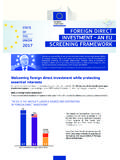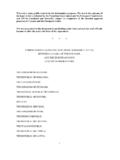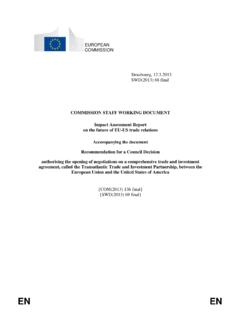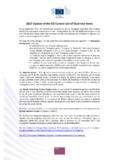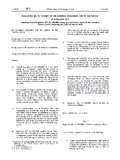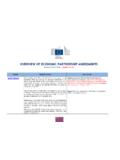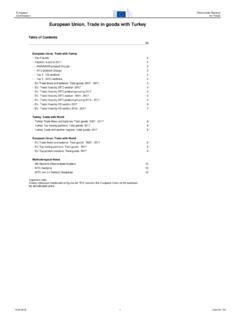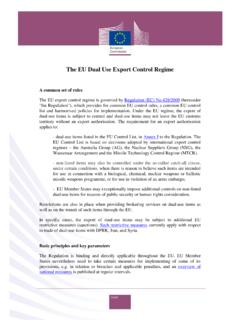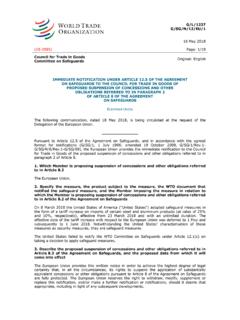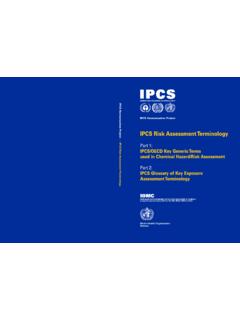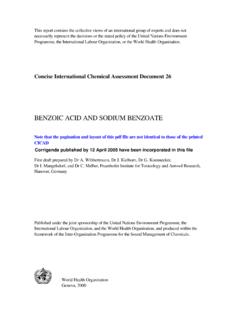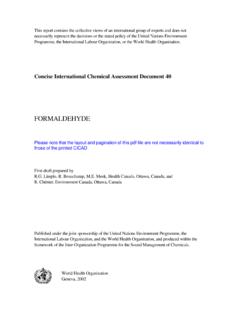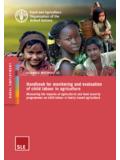Transcription of EU-Singapore FTA: Chapter 12: Trade and Sustainable ...
1 1 Chapter TWELVE Trade AND Sustainable development SECTION A Introductory Provisions Article Context and Objectives 1. The Parties recall the Agenda 21 of the United Nations Conference on Environment and development of 1992, the Preamble to the WTO Agreement, the Singapore Ministerial Declaration of the WTO of 1996, the Johannesburg Plan of Implementation on Sustainable development of 2002, the Ministerial Declaration of the UN Economic and Social Council on Generating Full and Productive Employment and Decent Work for All of 2006, and the international labour Organization (hereinafter referred to as ILO ) Declaration on Social Justice for a Fair Globalization of 2008.
2 In view of these instruments, the Parties reaffirm their commitment to developing and promoting international Trade and their bilateral Trade and economic relationship in such a way as to contribute to Sustainable development . 2. The Parties recognise that economic development , social development and environmental protection are interdependent and mutually reinforcing components of Sustainable development . They underline the benefit of cooperation on Trade -related social and environmental issues as part of a global approach to Trade and Sustainable development . 3. The Parties recognise that it is inappropriate to encourage Trade or investment by weakening or reducing the protections afforded in domestic labour and environment laws.
3 At the same time, the Parties stress that environmental and labour standards should not be used for protectionist Trade purposes. 4. The Parties recognise that it is their aim to strengthen their Trade relations and cooperation in ways that promote Sustainable development in the context of paragraphs 1 and 2. In light of the specific circumstances of each Party, it is not their intention to harmonise the labour or environment standards of the Parties. Article Right to Regulate and Levels of Protection 1. The Parties recognise the right of each Party to establish its own levels of environmental and labour protection, and to adopt or modify accordingly its relevant laws and policies, consistent with the principles of internationally recognised standards or agreements, to which it is a party, referred to in Articles (Multilateral labour Standards and Agreements) and (Multilateral Environmental Standards and Agreements).
4 2. The Parties shall continue to improve those laws and policies, and shall strive towards providing and encouraging high levels of environmental and labour protection. 2 SECTION B Trade and Sustainable development labour Aspects1 Article Multilateral labour Standards and Agreements 1. The Parties recognise the value of international cooperation and agreements on employment and labour affairs as a response of the international community to economic, employment and social challenges and opportunities resulting from globalisation. They commit to consulting and cooperating as appropriate on Trade -related labour and employment issues of mutual interest.
5 2. The Parties reaffirm their commitments, under the Ministerial Declaration of the UN Economic and Social Council on Generating Full and Productive Employment and Decent Work for All of 2006, to recognising full and productive employment and decent work for all as a key element of Sustainable development for all countries and as a priority objective of international cooperation. The Parties resolve to promote the development of international Trade in a way that is conducive to full and productive employment and decent work for all. 3. In accordance with the obligations assumed under the ILO and the ILO Declaration on Fundamental Principles and Rights at Work and its Follow-up adopted by the international labour Conference at its 86th Session in 1998, the Parties commit to respecting, promoting and effectively implementing the principles concerning the fundamental rights at work, namely: (a) freedom of association and the effective recognition of the right to collective bargaining; (b) the elimination of all forms of forced or compulsory labour ; (c) the effective abolition of child labour .
6 And (d) the elimination of discrimination in respect of employment and occupation. The Parties reaffirm the commitments to effectively implementing the ILO Conventions that Singapore and the Member States of the Union have ratified respectively. 4. The Parties will make continued and sustained efforts towards ratifying and effectively implementing the fundamental ILO conventions and they will exchange information in this regard. The Parties will also consider the ratification and effective implementation of other ILO conventions, taking into account domestic circumstances. The Parties will exchange information in this regard.
7 5. The Parties recognise that the violation of fundamental principles and rights at work cannot be invoked or otherwise used as a legitimate comparative advantage. 1 When labour is referred to in this Chapter , it includes the issues relevant to the Decent Work Agenda as agreed on in the ILO and in the Ministerial Declaration of the UN Economic and Social Council on Generating Full and Productive Employment and Decent Work for All of 2006. 3 Article labour Cooperation in the Context of Trade and Sustainable development The Parties recognise the importance of working together on Trade -related aspects of labour policies in order to achieve the objectives of this Agreement.
8 The Parties may initiate cooperative activities of mutual benefit in areas including but not limited to: (a) cooperation in international fora addressing labour aspects of Trade and Sustainable development , including but not limited to the ILO and Asia-Europe Meeting; (b) information exchange and the sharing of good practices in areas such as labour laws and practices, compliance and enforcement systems, labour dispute management, labour consultation, labour -management cooperation and occupational safety and health; (c) exchange of views on the positive and negative impacts of the Agreement on labour aspects of Sustainable development and ways to enhance, prevent or mitigate them, taking into account sustainability impact assessments carried out by either or both Parties; (d) exchange of views on the promotion of the ratification of fundamental ILO Conventions and other conventions of mutual interest, as well as on the effective implementation of ratified conventions.
9 (e) cooperation on Trade -related aspects of the ILO Decent Work Agenda, including on the interlinkages between Trade and full and productive employment, labour market adjustment, core labour standards, labour statistics, human resources development and lifelong learning, social protection and social inclusion, social dialogue and gender equality; and (f) exchange of views on the Trade impact of labour regulations, norms and standards. Article Scientific Information Each Party shall, when preparing and implementing measures aimed at health and safety at work which may affect Trade or investment between the Parties, take account of relevant scientific and technical information and related international standards, guidelines or recommendations if they exist, including the precautionary principle as enshrined in such international standards, guidelines or recommendations.
10 SECTION C Trade and Sustainable development Environmental Aspects Article Multilateral Environmental Standards and Agreements 1. The Parties recognise the value of international environmental governance and agreements as a response of the international community to global or regional environmental problems and they stress the need to enhance the mutual supportiveness between Trade and environment policies, rules and measures. In this context, they will consult and cooperate as appropriate with respect to negotiations on Trade -related environmental issues of mutual interest. 4 2. The Parties shall effectively implement in their respective laws, regulations or other measures and practices in their territories, the multilateral environmental agreements to which they are 3.
